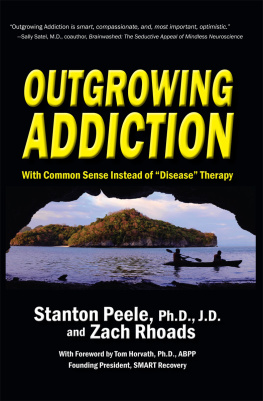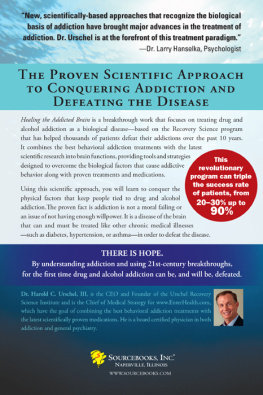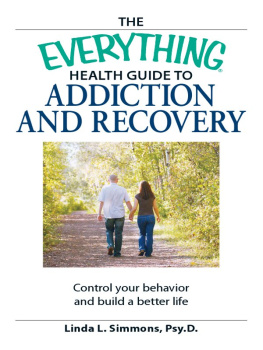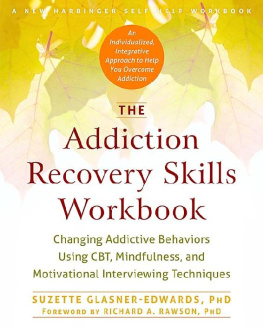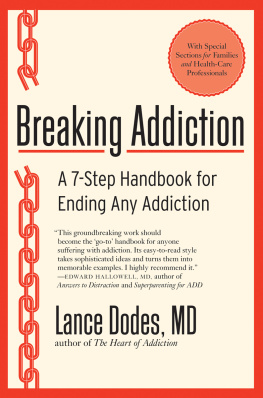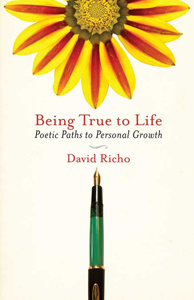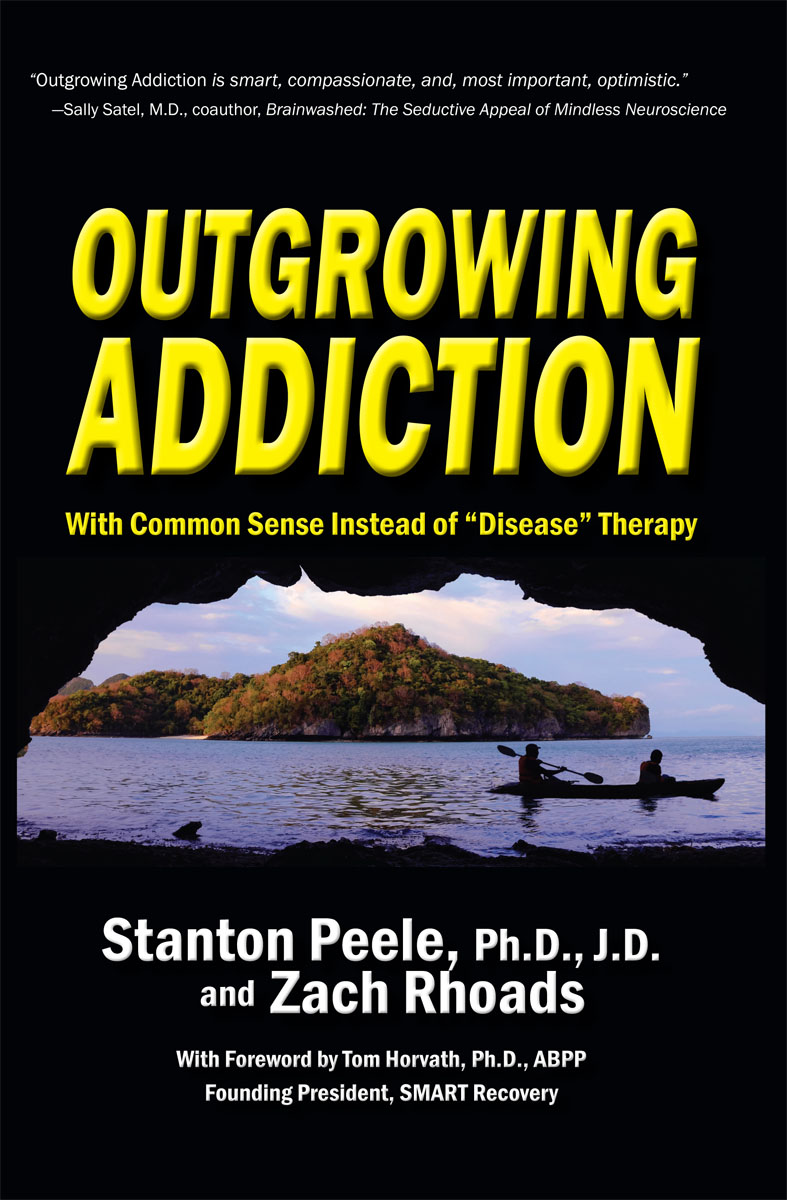
Praise for Outgrowing Addiction
Countless people have found solutions to their substance use problems in Stanton Peeles books after many years of painful struggle in treatment, and thought I wish Id read this before I went to my first rehab. Your child neednt have this bittersweet experience. Outgrowing Addiction is a meditation for parents on how to avoid the trap of medicalizing their childrens normal life struggles. You instinctively seek to cultivate your childs full potential. Yet you face mounting pressure from institutions to label and limit your child, going directly against your better instincts. With Stanton and Zach Rhoads on your side as voices of reason, youll be able to resist the pressure from institutions to label and limit your childrenand instead rely on your common sense and unique bond to help them grow beyond and benefit from any struggles they may encounter.
Steven Slate, co-author of The Freedom Model for Addictions: Escape The Treatment and Recovery Trap
The idea that addiction develops isnt new. What is unique and remarkable about this book is the authors attention to the complexity of that process. Their nuanced model, backed up by rich biographical vignettes as well as clear, reliable data, is especially sensitive to the interplay of developmental timing (stages of development) and the massive impacts of the social environmentboth spawning addiction and ultimately helping to overcome it. Peele and Rhoads skillfully refute the faulty (but fashionable) conclusion that addiction is a brain disease. Instead, their view of addiction as a turbulent but natural stage of need fulfillment allows us to replace the bogey man of chronic illness with an emphasis on empowerment, determination, and personal growth. A truly comprehensive and masterful piece of work.
Marc Lewis, Ph.D., Professor Emeritus,
University of Toronto; author of Memoirs of an Addicted Brain and The Biology of Desire: Why Addiction is Not a Disease
The evidence keeps pouring in that, over four decades ago when he published Love and Addiction, Stanton Peele was fundamentally correct about addiction and how to outgrow it. In this latest work Peele and Rhoads incorporate recent scientific and cultural evidence showing that viewing addiction as a disease is actually harmful, that addiction involves the whole person (not just the brain), that most people will outgrow addiction (and there are ways to accelerate that process), and that pursuing a valued and constructive new life path can move one entirely beyond addiction.
From the Foreword by Tom Horvath, Ph.D., ABPP, founding president, SMART Recovery
For decades, Stanton Peele has been one of the leading voices in revising our views of addiction, drug education and drug policy. His new book with Zach Rhoads, Outgrowing Addiction, continues and extends this pioneering work to children and stakeholders in child well-being. It is a godsend for anyone seeking a solution to the opioids crisis.
Carl Hart, Ph.D., Professor of Neuroscience and Psychology, Chair of Department of Psychology, Columbia University; author, High Price
Stanton Peele is a true pioneer of attempts to reveal the inadequacies of the disease view of addiction. His latest book with Zach Rhoads articulates, in clear and accessible language, a rational and evidence-based alternative to the disease viewthe developmental model of addiction. Of particular importance here is the understanding the authors provide about the growing minds of adolescents and their chances of becoming and staying addicted. Though aimed at an American readership, the books topical relevance and its accumulated wisdom apply far beyond the boundaries of the USA.
Nick Heather, Ph.D., Emeritus Professor of Alcohol & Other Drug Studies, Northumbria University, UK; former director, Australian National Drug and Alcohol Research Centre
Stanton Peele and Zach Rhoads help us think more deeply about the nature of addiction and the canned rhetoric that we hear every day. Their book explores the vulnerabilities to addiction, the dynamics of self-destructive drug use, and the pathways out. Most critically for users and their families, the book shows how to accelerate the processes that lead users to relinquish drugs. Outgrowing Addiction is smart, compassionate, and, most important, optimistic.
Sally Satel, M.D., coauthor,
Brainwashed: The Seductive Appeal of Mindless Neuroscience; lecturer, Yale University School of Medicine
In my clinical work, I often encounter teens and parents who have been misled to believe addiction is a life-long condition they can never hope to escape. Stanton Peele and Zach Rhoads combat that mistaken and dangerous message with research evidence, clear explanations, and above all, the compelling stories of success families need. Outgrowing Addiction will have a prominent place on my lending bookshelf for families in my practice.
Pippa Abston, M.D., Ph.D., FAAP, Assistant Professor of Pediatrics,
University of Alabama School of Medicine, Huntsville
The research behind this book is fascinating. Peele and Rhoads analysis, interpretation, and out of the box thinking about it offers a unique and hopeful perspective of a better future for people struggling with addiction. This book is upbeat, honest and offers realistic and practical strategies for those in addiction. In this work addiction is examined through a lens of care and respect. One of the most powerful aspects of this book is the coaching model used to support children. Having these tools enables adults to have difficult and important conversations with children of any and all agesconversations that could help prevent them from becoming addicted in the first place.
Robin Ploof, Ph.D., Professor and Program Director,
Early Childhood Division of Education and Human Studies, Champlain College, Burlington, Vt.
Things work until they dont, whether its an educational system so obsessed with how children perform and what each must become that it has lost sight of who they are and what each is experiencing each day. Could it be what has been highlighted in Outgrowing Addictiona mindset anchored in disease, disorder, and labels that treats symptoms, rather than doing the hard work of adjusting the conditions of childrens environments? Whatever the cause, when things dont work, it is time to adjust. Throughout the pages of this book, Zach Rhoads and Stanton Peele present what adjustment requiresordinary people willing to see differently, think differently, and act differently to achieve extraordinary results.
Jeanine K. Fitzgerald, creator of The Fitzgerald Institute of Lifelong Learning, author of The Dance of Interaction: A Guide to Managing Childrens Challenging Behaviors
Based on compassion, science and good old-fashioned family values, this book empowers us by tapping into our resilience and reinforcing our innate strengths and resources. It embraces person-centered harm reduction approaches that have been the foundation of successful public health policies and programs for decades, thereby offering optimism and hope for people using substances problematically and their loved ones to move forward with their lives in healthy and constructive ways.
Barry Lessin, CAADC, family therapist, co-founder of Families for Sensible Drug Policy
Outgrowing Addiction is not afraid to challenge long-held beliefs about drug use, no matter how widespread and entrenched they might be. In the midst of Americas opioid epidemic, it has never been more important to raise the questions that Stanton Peele and Zach Rhoads have here.
Next page
